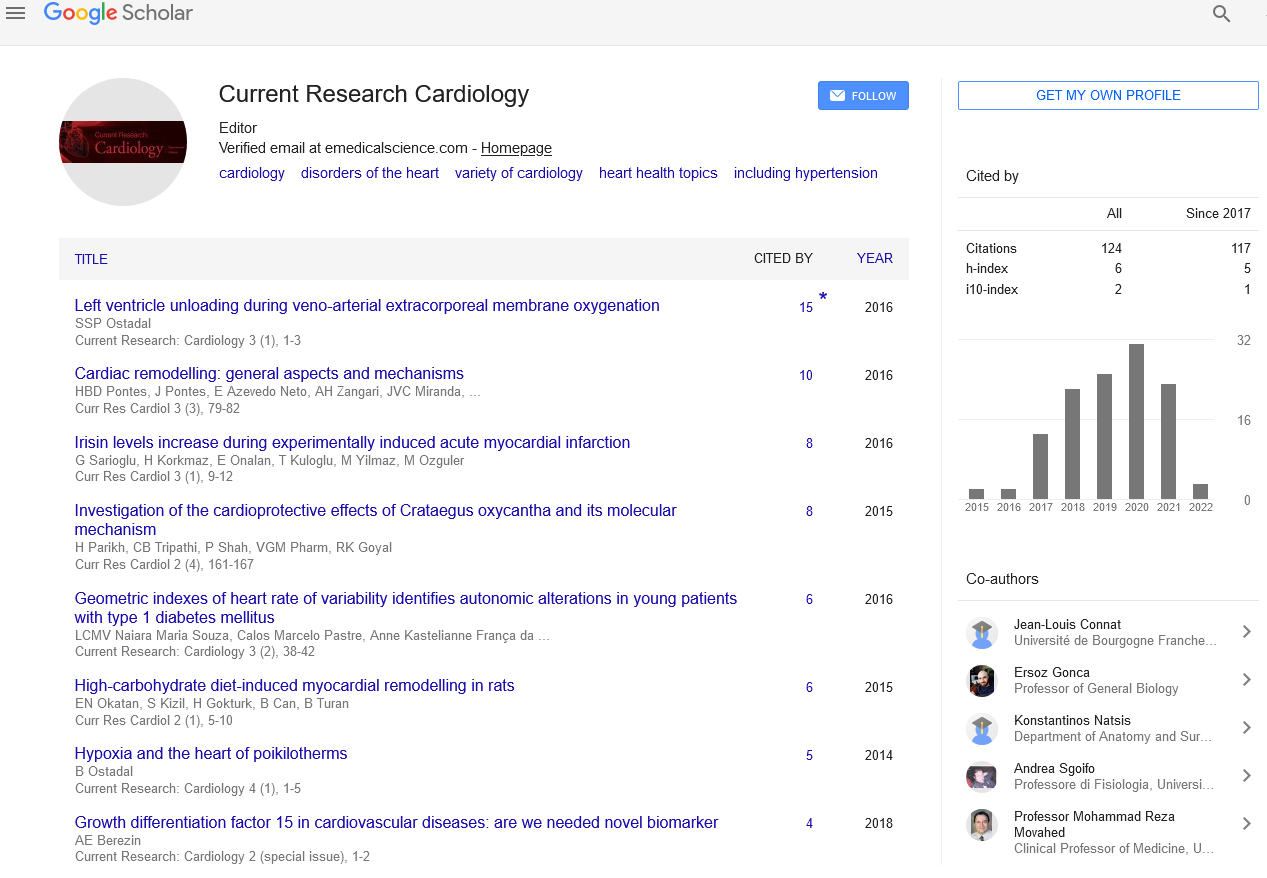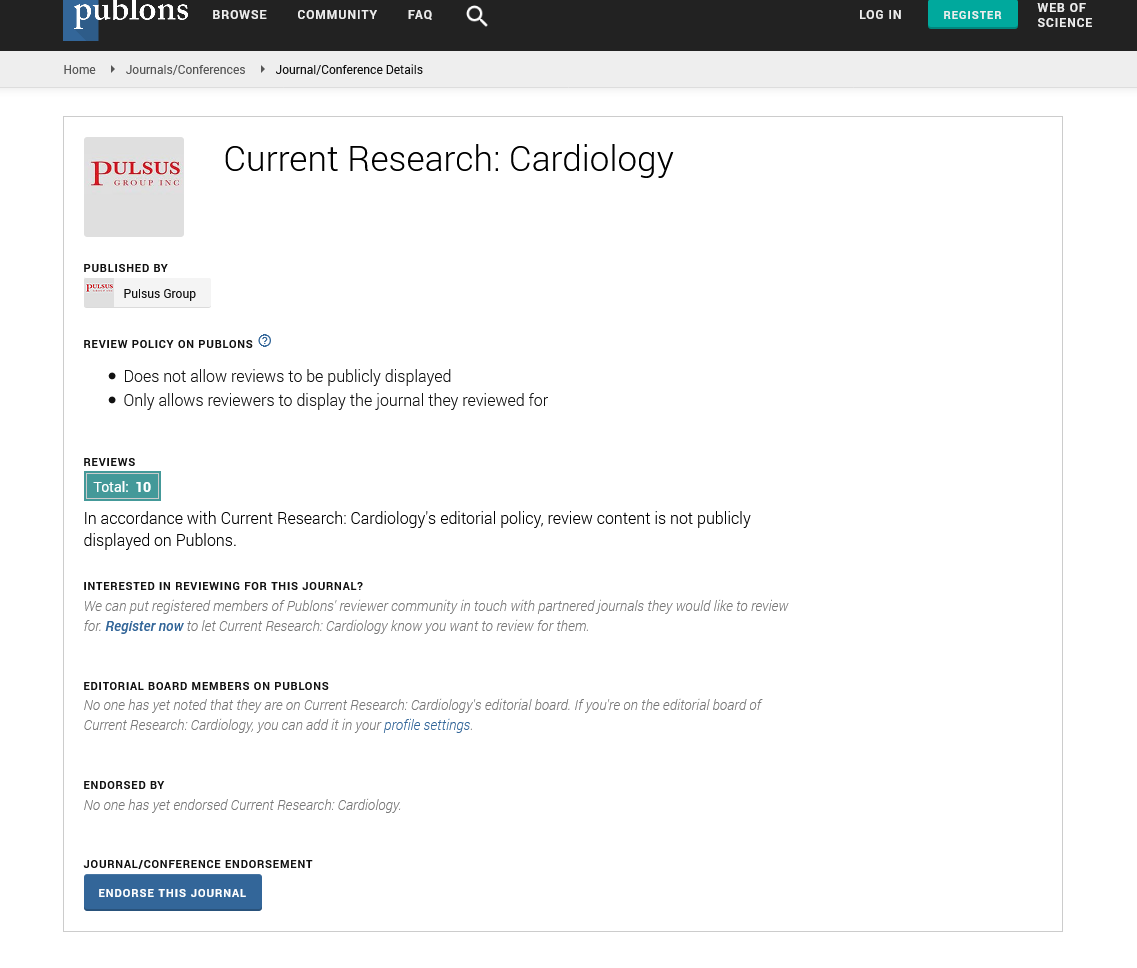Treatment for cardiovascular disease
Received: 15-Nov-2021 Accepted Date: Nov 29, 2021; Published: 06-Dec-2021
Citation: Chen Z,Treatment for cardiovascular disease. Curr Res Cardiol: open access,2021;8(4):5.
This open-access article is distributed under the terms of the Creative Commons Attribution Non-Commercial License (CC BY-NC) (http://creativecommons.org/licenses/by-nc/4.0/), which permits reuse, distribution and reproduction of the article, provided that the original work is properly cited and the reuse is restricted to noncommercial purposes. For commercial reuse, contact reprints@pulsus.com
Description
There are many different types and combinations of medications that can be used to treat Coronary Artery Disease (CAD), and cardiologist or other health care provider will choose the optimal one for the cardiac patients. Anticoagulants, antiplatelet agents and dual antiplatelet therapy, Angiotensin Converting Enzyme Inhibitors (ACE-I), angiotensin II receptor blockers, angiotensin receptor-neprilysin inhibitors, beta blockers, calcium channel blockers, cholesterol-lowering medications, digitalis preparations, diuretics and vasodilators are some of the class of medications which are used as pharmacological therapy against cardiovascular disease.
Anticoagulants
This class of medications acts by decreasing the clotting ability of the blood. Anticoagulants are also called as blood thinners. Commonly prescribed anticoagulants include such as apixaban, dabigatran, edoxaban, heparin, rivaroxaban and warfarin. This class of drugs does not dissolve existing blood clots and these are used to treat certain blood vessel, heart and lung conditions. Anticoagulants help to prevent the clots from becoming larger and causing more serious problems and also prevention from prevent harmful clots from forming in the blood vessels. These are often prescribed to prevent first or recurrent stroke.
Antiplatelet agents and Dual Antiplatelet Therapy (DAPT)
Aspirin, clopidogrel, and dipyridamole are some of the most commonly recommended medications. To prevent blood clotting, some patients with severe heart attacks, have stents placed in their coronary arteries, or have Coronary Artery Bypass Graft surgery (CABG) are administered two types of antiplatelet drugs at the same time which is known as dual antiplatelet treatment . Aspirin is one antiplatelet agent where almost everyone with coronary artery disease is prescribed aspirin for the rest of their lives, including those who have had a heart attack, stent, or CABG. In addition to aspirin therapy, a second type of antiplatelet drug known as a P2Y12 inhibitor is frequently administered. In platelets and megakaryocytes, aspirin (acetylsalicylic acid) inhibits prostaglandin-H synthase (cyclooxygenase-1) irreversibly, preventing the synthesis of thromboxane A2 (TXA2; a potent vasoconstrictor and platelet aggregate). This class of medications can be used to prevent clotting in patients who have had a heart attack, unstable angina, ischemic strokes, transient ischemic episodes, and other types of cardiovascular illness and can also be used to prevent clotting in individuals who have plaque build-up but no major blockage in the artery.
Angiotensin-Converting Enzyme-Inhibitors (ACE-I)
ACE-I includes such as benazepril, captopril, enalapril, fosinopril, lisinopril, moexipril, perindopril, quinapril, ramipril, trandolapril. ACE-I act by expanding blood vessels and decreases resistance by lowering levels of angiotensin II and allows blood to flow more easily and thereby makes the heart's work easier or more efficient. This class of medications is used to treat or improve symptoms of cardiovascular conditions including high blood pressure and heart failure.
Angiotensin II receptor blockers
Angiotensin II Receptor Blockers includes such as azilsartan, candesartan, eprosartan, irbesartan, losartan, olmesartan, telmisartan, valsartan, which are also known as ARBs. ARBs work by blocking receptors that the hormone acts on, specifically AT1 receptors, which are found in the heart, blood vessels and kidneys. Blocking the action of angiotensin II helps to lower blood pressure and prevent damage to the heart and kidneys. These are used to improve symptoms of cardiovascular conditions including high blood pressure and heart failure.






